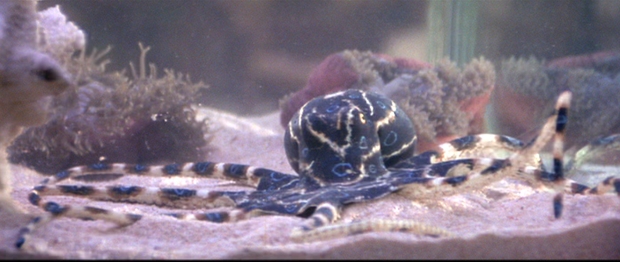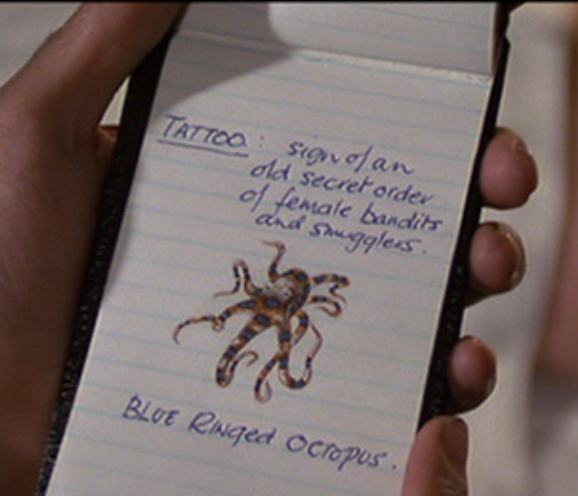A Bond film a month until Skyfall next October. BlogalongaBond. I continue through the Roger Moores like wading through so much treacle. I was enjoying Octopussy until all that mucking about on the circus train, then I got bored. And while I was musing on potentially perverse definitions of the word “octopussy” I realised that, in fact, the octopus is the most interesting thing about this film. Incidentally, I was not brave enough to put “octopussy” into google without the SafeSearch on.
What’s in a name?
My first stumbling block in Octopussy is the pluralisation of octopus: octopuses or octopi. Well, the origin of the name “octopus” stems from the greek for eight footed. Okto- : eight, pous-: feet. The use of the suffix -us is common in latin and the standard pluralisation of latin words ending in -us is to replace it with -i. Hence cactus -> cacti. There are common exceptions, for example the commonly used plural of campus is campuses, rather than campi. Octopus however has its etymological origins in greek rather than latin, so many object to the pluralisation octopi on these grounds.
There are three plural forms of octopus: octopuses [ˈɒktəpəsɪz], octopi [ˈɒktəpaɪ], and octopodes [ˌɒkˈtəʊpədiːz]. Currently, octopuses is the most common form in the UK as well as the US; octopodes is rare, and octopi is often objectionable.
Wikipedia
Many sources agree that while “octopodes” is technically correct, it is pedantic and there is the general impression that the sort of people using the word “octopodes” don’t get out enough. Furthermore, although many argue that octopus is a greek word, some bright spark has pointed out that octopus is actually a latinised-greek word. The word octopus wasn’t used to refer to the animal it describes until 1758, long after the Greeks and Romans were conjugating language.
Therefore, octopuses is generally accepted.
It does, however, bring the following exchange to mind.
Biology
Octopuses are cephalopod molluscs with no form of skeleton (like other molluscs) so they are able to squeeze through very small gaps. When it comes to dealing with predators, they have numerous defence mechanisms: they produce ink, have the ability to change colour and they are venomous.
Their physiology is, frankly, bizarre by our standards – an octopus has 3 hearts. Two brachial hearts pump blood through the gills and the third pumps blood around the body.
I have borrowed this pictograph to show you the inner workings of an octopus:
The blood contains coppers rather than iron to carry oxygen around the body. Also, the haemocyanin protein that carries the oxygen is dissolved in the blood rather than being contained within red blood cells as is in mammals. This give their blood a bluish colour.
The blue-ringed octopuses – as featured in Octopussy – are a group of 3 (possibly 4) species of octopus. They are quite small in size and they have numerous chromophores in their skin which are normally brown to aid camouflage. If the octopus is threatened, these patches turn blue. Octopuses produce ink which is contained in their ink sacs (located just below their gills), the ink contains the pigment melanin and mucous and is squirted out with the help of a jet of water from the funnel. In the blue-ringed octopus species, the ink sac has shrunk during evolution. Young blue-ringed octopuses can still effectively squirt ink, however the adults of two of the species do not produce ink at all, a third species can but is pretty crap at it.
Toxic bite
Blue-ringed octopuses are the only group of octopus with venom that can kill humans. The list of chemicals in the venom are: tetrodotoxin, 5-hydroxytripamine, hyaluronidase, tyramine, histamine, tryptamine, taurine, acetylcholine and dopamine. The most important of these is tetrodotoxin, known to a bunch of lazy pharmacologists and neuroscientists as TTX. TTX is the same toxin found in pufferfish and is around 100 times more toxic than cyanide. It’s produced by bacteria that live in the octopus’ salivary glands. TTX blocks nerve transmission, so once someone is bitten, paralysis ensues. The patient is unable to breathe, so unless they are ventilated they will quickly die. Treatment is by artificial ventilation; the body is able to break down the toxin so after about 24 hours of ventilation, the patient will most likely make a full recovery.
A clever little bastard
Experiments have shown that octopuses are highly intelligent, far more so than other invertebrates. They are adept problem-solvers, showing both short- and long-term memory, although they learn next-to-nothing from their parents as they have little or no contact. In science laboratories, octopuses have show fear directed a specific individuals. This gives them the same level of protection under the law as vertebrates with respect to scientific experiments.
Their intelligence makes them problematic as pets as they have a tendency to escape from aquariums.
I wouldn’t want to encounter one of these guys on the run…
Barring encounters with poisonous octopodes, Schiensh will return for Roger Moore’s penultimate outing as Bond in A View to a Kill.



